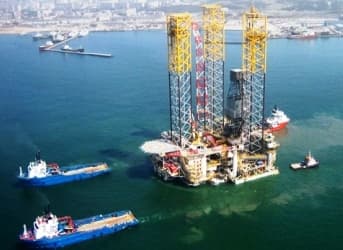One of the greatest overlooked stories of the past two decades is China’s slow economic penetration of the former Soviet Central Asian states. Chinese President Xi Jinping, visiting Kazakhstan on his way to the G20 summit in St. Petersburg, stopped off in Kazakhstan and scored an extraordinary energy coup for his country.
On 7 September Xi initialed an agreement with Kazakhstan's state energy company KazMunaiGas for state-owned China National Petroleum Corp. to purchase an 8.33 per cent stake in Kazakhstan’s Kashagan Caspian offshore project for roughly $5 billion, according to Kazakh government sources.
Kashagan is the world’s largest “superfield” oil discovery in five decades, and China beat out India to clinch the deal. Xi told a press conference after discussions with Kazakh President Nursultan Nazarbayev, "The two countries have agreed on China's shareholding in the development of the Kashagan deposit."
But Kashagan is only the proverbial tip of the iceberg, as Nazarbayev announced that 22 agreements in all, worth $30 billion, including energy deals, among them building an oil refinery in Kazakhstan, were concluded during Xi's visit.
Related article: Nigeria becoming World’s 1st Failed Petrostate?
Kazakhstan's offshore Kashagan Caspian Sea field, discovered in 2000, is the largest oil field uncovered in the last 30 years, with potential reserves estimated to be as high as 70 billion barrels. For a comparison, the Norwegian sector of the joint British-Norwegian North Sea oil fields contains approximately 30 billion barrels of recoverable crude. While North Sea oil was discovered in the early 1960s, its first well only began producing in 1971; costs and technological hurdles delayed full development of the fields until the 1980s, when rising oil prices made their development profitable.
The total Kashagan Contract area covers more than 2,125 square miles of northern Caspian Sea waters and contains five separate fields -- Kashgan, Kalamkas A, Kashagan Southwest, Aktote and Kairan.
Under terms of the North Caspian Sea Production Sharing Agreement signed in 2001, Italy's Eni under the joint-venture company name of AgipKCO (Agip Kazakhstan North Caspian Operating Co.) operated Kashagan. AgipKCO included Kazakhstan's national hydrocarbon concern KazMunaiGas and Japan's Inpex, both of which originally held an 8.33 percent share in the project, with ConocoPhillips retaining a 9.26 percent share. Four major foreign oil companies dominated Kashagan - Eni, France's Total, U.S. ExxonMobil and Anglo-Dutch Shell, which all held 18.52 percent stakes each.
In 2007 however, the Kazakh government, citing environmental concerns and cost overruns unilaterally renegotiated the PSA agreement. When the dust settled in January 2008, KazMunaiGas increased its share in the Kashagan project from 8.33 percent to 16.81 percent as a result of its foreign consortium partners surrendering 2 percent apiece of their stake while agreeing to pay up to $5 billion as compensation for lost profits due to cost overruns and significant delays in commercial production.
Kashagan will significantly boost Kazakh oil exports, currently running at approximately 1.2 million barrels per day. Analysts estimate that by 2021 Kazakhstan could be pumping nearly 4 million barrels a day, a rate that would put it only slightly behind Organization of Petroleum Exporting Countries member Iran and its daily production of 4.5 million bpd.
Related article: How Events in Syria Affect the Global Oil Markets
And where did the Kashagan stake bought by the Chinese come from?
Well, two months ago the Kazakh government decided to use its preemptive right to buy the 8.4 per cent stake in Kashagan that U.S. oil major ConocoPhillips was selling for, oddly enough, $5 billion.
Adding to the murky intrigue, in 2012 ConocoPhillips, downsizing its global portfolio, announced that it had agreed to sell its Kashagan stake to the overseas branch of the Indian state-run oil and gas company ONGC. Needless to say, that deal seems dead now.
Pumping up Kashagan’s visibility, the consortium announced on 11 September that Kashagan had begun pumping its first oil.
The future?
Kashagan operator Eni reported that Kashgan’s first production phase will be 180,000 barrels a day, rising to 370,000 bpd and eventually soaring to 1.5 million bpd.
Hard not to say that President Xi snagged himself a bargain.
By. John C.K. Daly of Oilprice.com


















